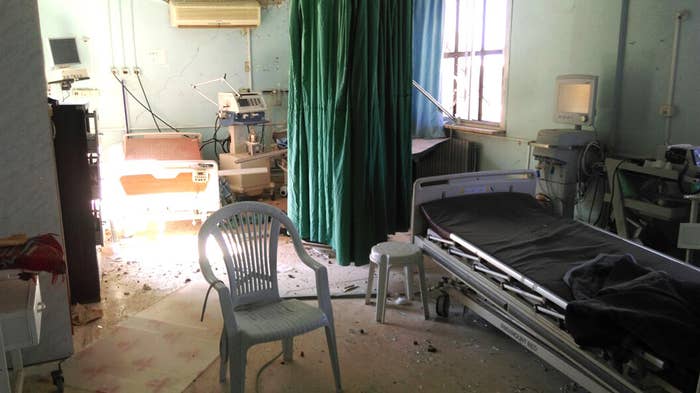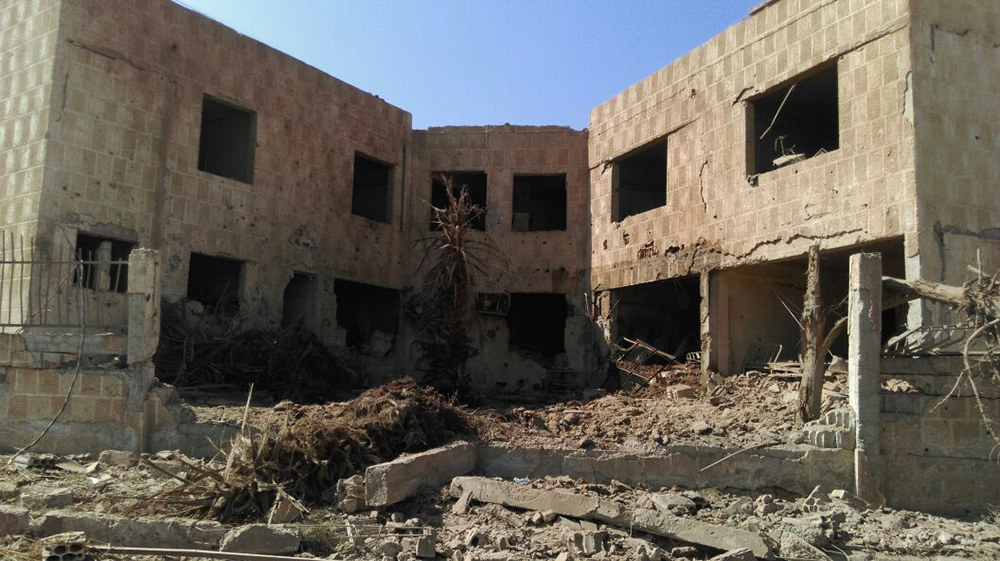
ISTANBUL — The Syrian government has been attacking hospitals across the war-torn country with alarming regularity, according to doctors and NGOs working there.
A 45-year-old pediatrician who runs a children's hospital in the northern city of Aleppo — and who asked to go by his first name, Hassan, for security reasons — recounted one airstrike on June 10 that knocked the facility out of service for days. Early in the morning, Dr. Hassan said in an interview via Skype, a government aircraft dropped a barrel bomb that hit just outside the hospital, sending staff scrambling to relocate patients and pull infants from their incubators.
“It was so dangerous, but it would have been more dangerous to leave them there,” he said.
The use of barrel bombs — crude, powerful explosives that wreak havoc on civilians who remain in places like Aleppo, a key theater of the war — has been widely condemned by the international community. Attacks on hospitals, meanwhile, are banned under the Geneva Convention. The government of Syrian president Bashar al-Assad has nonetheless carried them out throughout the war, Dr. Hassan and others said, intensifying the suffering in a conflict that has left more than 220,000 dead and created over 4 million refugees.

One doctor working at a hospital in the southern province of Daraa recounted the latest barrel-bomb attack there, which he said hit earlier this month.
“We are working amid the generators and the bustle of the place, so often we don’t hear the roar of the helicopter hovering over our heads,” he said, also requesting anonymity for his safety.
“We heard the sound of a powerful explosion, and then glass from the windows fell on us, and all the mothers of the children in the [maternity ward] were screaming.”
Fadel Abdul Ghani, who runs the Syrian Network for Human Rights, a monitoring group that documents government airstrikes, said the attacks on hospitals are a “systematic and widespread strategy” employed by the government. “The majority of the hospitals [in opposition-held areas] have been targeted,” he said.
Abdul Ghani said hospital attacks often escalate in areas that rebels have recently captured. This has been the case of late in Idlib province, he said, which government forces ceded this spring. “The regime wants to show that it is the only state, and it doesn’t want to allow any kind of life or government in opposition-held areas,” he said. “The aim is to increase the suffering of the population there.”
Doctors Without Borders, which operates and supports medical facilities throughout Syria, said that between Aug. 7 and 10, government airstrikes hit or landed near nine hospitals in Idlib. “You really have to start questioning the intent when you see such seemingly targeted bombings directly on, or in the vicinity of, these medical facilities,” said Sylvain Groulx, its head of mission in Syria. “What we saw in the days after the [rebel] takeover in Idlib City was the very specific bombing of medical facilities that up until then had not been touched.”
He added: “It seems quite clear that they wanted to make sure these hospitals were not going to be used.”
According to doctors and NGOs, a spike in hospital attacks in Aleppo, which is bitterly contested, began in late May. “It’s not more of the same,” said one Western official who has been monitoring the attacks, and who spoke on condition of anonymity to avoid jeopardizing his work in Syria. “It’s really a systematic campaign of attacks against hospitals.”
“I’m sure no one will stop the regime.”
The official compiled a list of seven strikes that hit Aleppo hospitals as the escalation began, over the course of two weeks from May 31 to June 11. The pace was relentless: two hospitals, including the one run by Dr. Hassan, hit with barrel bombs on a Wednesday; another hit with a barrel bomb the following day. The attacks have continued since, causing hospitals to flicker in and out of service, with locals scrambling to repair the damage in some as others come under attack.
“This is not something that’s happening at random,” the official said. “Hospitals have been totally destroyed.”
Dr. Hassan, the pediatrician, said the government’s bombing of hospitals in Aleppo was “more aggressive” than ever. “I think the regime wants civilians to leave the area,” he said.
He believed the attacks would continue and said the staff had been working to build a cement blast wall outside the hospital.
“Maybe it won’t work. But this is the only thing we can do,” he said. “I’m sure no one will stop the regime.”
The government attacks on hospitals and other civilian targets — such as a market in Douma, outside Damascus, where an airstrike massacred around 100 people on Sunday — have brought condemnation from NGOs working to ease the suffering in the country.
“It’s quite clear that the regime is bombing civilians indiscriminately, and we see it all the time,” said Rae McGrath, the country director for Turkey and northern Syria at Mercy Corps. “You only have to look at the scale of civilian casualties to understand that these attacks must be seen as disproportionate. And disproportionate sounds like one of those technical words that’s avoiding the issue of saying 'killing civilians,' but it’s not, because we all accept that in wars civilians get killed. Disproportionate means that there isn’t the requisite care being taken to avoid civilian casualties. And that’s a war crime.”

The hospital attacks show the strange position the U.S. finds itself in as it shares the skies over Syria with the Syrian military. While the U.S. is conducting airstrikes against ISIS in the country, it has refrained from acting against Assad throughout a brutal civil war in which his forces are responsible for the vast majority of civilian casualties.
The attacks also underline the inefficacy of international efforts to prevent civilian casualties in Syria, as the government continues to launch indiscriminate attacks with weapons like barrel bombs and chemical weapons. Recent strikes against hospitals, in fact, came amid a series of U.N. statements about the spiraling humanitarian situation.
“Indiscriminate attacks, including on schools and hospitals, continued with no regard for the protection of civilians,” read a U.N. release on May 28. Similar statements on May 30 and June 5 were issued amid continued hospital attacks and other government strikes against civilians — one such missile attack on June 4 on the city center in Idlib was described as “horrific” by Doctors Without Borders.
When the U.N. issued a statement condemning Sunday’s attack in Douma, the Syrian government accused it of bias.
Maryana McGlasson, who oversees aid efforts in northern Syria for Relief International, said there is a “need for immediate action to stop the annihilation of what remains of the health systems in opposition-controlled or contested areas of Syria.”
“There is no amount of humanitarian aid that can stop this destruction,” she added.
But in an interview over Facebook, a surgeon in the war-torn Damascus suburb of Ghouta, Maged al-Dalati, expressed little hope that the attacks would cease.
“They bombed this hospital five times,” he said, adding that the most recent attack came on Aug. 8. “The regime knows that there is a hospital here, and it wants to destroy it.”


